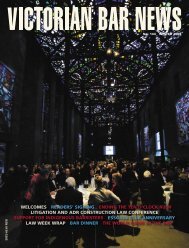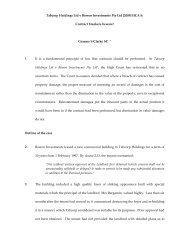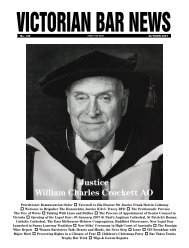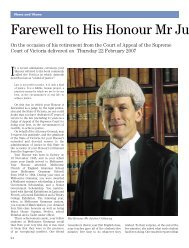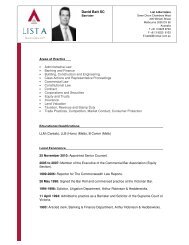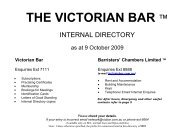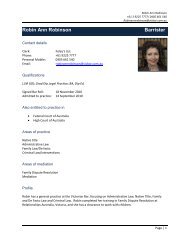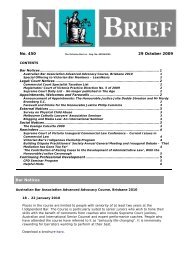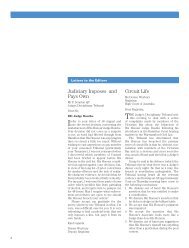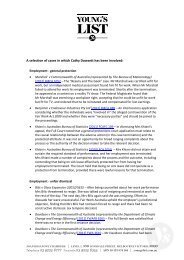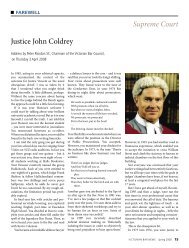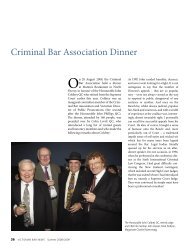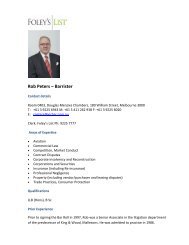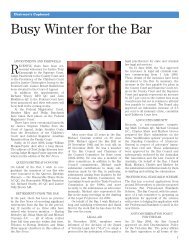VICTORIAN CIVIL AND ADMINISTRATIVE TRIBUNAL - Victorian Bar
VICTORIAN CIVIL AND ADMINISTRATIVE TRIBUNAL - Victorian Bar
VICTORIAN CIVIL AND ADMINISTRATIVE TRIBUNAL - Victorian Bar
Create successful ePaper yourself
Turn your PDF publications into a flip-book with our unique Google optimized e-Paper software.
<strong>VICTORIAN</strong> <strong>CIVIL</strong> <strong>AND</strong> <strong>ADMINISTRATIVE</strong> <strong>TRIBUNAL</strong><br />
<strong>CIVIL</strong> DIVISION<br />
DOMESTIC BUILDING LIST<br />
VCAT REFERENCE NO. D181/2004<br />
CATCHWORDS<br />
Guarantee and indemnity – construction of – relevant principles<br />
APPLICANT<br />
FIRST RESPONDENT<br />
SECOND RESPONDENT<br />
JOINED PARTY<br />
WHERE HELD<br />
BEFORE<br />
HEARING TYPE<br />
Arrow International Australia Limited (ACN<br />
081 136 352)<br />
Indevelco Pty Ltd ( ACN 061 216 635)(in<br />
liquidation)<br />
Perpetual Nominees Ltd as custodian of The<br />
Colonial First State Income Fund (ACN 000<br />
733 700)<br />
John Zervos<br />
Melbourne<br />
Senior Member R. Walker<br />
Hearing<br />
DATE OF HEARING 22 October 2007<br />
DATE OF ORDER 12 November 2007<br />
CITATION<br />
Arrow International Australia Limited (ACN<br />
081 136 352) v Indevelco Pty Ltd ( ACN 061<br />
216 635)(in liquidation) & Anor (Domestic<br />
Building) [2007] VCAT 2239<br />
ORDER<br />
1. By consent of the Applicant and the Second Respondent:<br />
(a) order that the sum of $45,000.00, being part of the sum of $60,000.00<br />
lodged by the Applicant in the Domestic Builders Fund as security for<br />
the costs of the Second Respondent be paid out to the solicitors for the<br />
Second Respondent.<br />
(b) order that the balance of $15,000.00 lodged by the Applicant in the<br />
Fund be paid out to the Solicitors for the Applicant.<br />
(c) the Applicant’s claim against the Second Respondent is struck out<br />
with no order as to costs.
2. The Second Respondent’s claim against the Joined Party is dismissed.<br />
3. Costs reserved.<br />
4. Direct that any claim by the First Respondent with respect to the moneys<br />
paid by the Applicant into the Fund as security for its costs be made by 7<br />
December 2007 and a copy of the claim be served upon the solicitors for<br />
the Applicant.<br />
5. Any such claim is to be set down for hearing as soon as practicable with<br />
half a day allocated . A copy of any affidavit to be relied upon must be filed<br />
and served at least five working days before the haring.<br />
6. If no claim is made by the First Respondent by 7 December 2007 as<br />
aforesaid this proceeding is to be referred to me for an order in Chambers<br />
that the said sum be repaid to the solicitors for the Applicant.<br />
7. Direct the Registrar to send a copy of this order by prepaid post addressed<br />
to the Liquidator of the First Respondent, Mr S.L. Horne, Draper Dillon,<br />
Fawkner Centre, Level 4, 499 St Kilda Road, Melbourne, 3004 and also to<br />
its solicitors, Messrs Meerkin & Apel, PO Box 233, South Yarra, 3141.<br />
SENIOR MEMBER R. WALKER<br />
APPEARANCES:<br />
For the Applicant<br />
For the First Respondent<br />
For the Second Respondent<br />
For the Joined Party<br />
Mr and Mr B. Miller of Counsel<br />
No appearance<br />
Mr N. Frenkel of Counsel<br />
Mr R. Craig of Counsel<br />
VCAT Reference No. D181/2004 Page 2 of 13
Background<br />
REASONS<br />
1. At all material times, the First Respondent (“Indevelco”) was the owner of<br />
land in Yarraville (“the Land”) upon which it wished to construct 25<br />
apartments. The Applicant (“Arrow”) is a builder that agreed to construct<br />
the apartments for Indevelco pursuant to a building contract (“the Building<br />
Contract”). The Second Respondent (“Perpetual”) is a lender that agreed to<br />
advance the moneys to enable the apartments to be built. It was not a party<br />
to the Building Contract.<br />
2. In this proceeding, Arrow sued Indevelco for moneys said to be due to it<br />
pursuant to the Building Contract. It also sued Perpetual claiming that, by<br />
virtue of a tripartite deed (“the Tripartite Deed”) entered into by the three<br />
parties, Perpetual was directly liable to pay it the amount due.<br />
3. Perpetual sought indemnity in regard to Arrow’s claim against both<br />
Indevelco and the Joined Party (“Zervos”) pursuant to various documents<br />
detailed below.<br />
The hearing<br />
4. On 1 August 2007, Indevelco went into liquidation and Arrow’s proceeding<br />
against it became and remains stayed. The other claims came before me for<br />
hearing on 22 October 2007 with 10 days allocated. On the morning of the<br />
first day Arrow’s claim against Perpetual was settled and consent orders<br />
were agreed to which are reflected in the above order. In essence, the effect<br />
of these was that its claim was struck out and the sum of $45,000.00 would<br />
be paid to Perpetual towards its costs. That left the claim by Perpetual<br />
against Zervos for indemnity with respect to the costs that it has incurred in<br />
this proceeding.<br />
5. Because of the limited nature of the proceeding only one witness was called<br />
namely, Mr Abercrombie, a senior manager of a company with some<br />
connection with Perpetual (the complex connection between these various<br />
companies is not relevant to the outcome of the claim). Mr Abercrombie<br />
was cross examined by Mr Craig and I then heard submissions from<br />
Counsel. I reserved my decision.<br />
Conclusion<br />
6. The claim against Zervos is dependent upon a number of documents linked<br />
to a form of Guarantee and Indemnity. On the proper construction of these<br />
documents I am not satisfied that the amounts sought by Perpetual against<br />
Zervos are recoverable. The claim by Perpetual against Zervos will<br />
therefore be dismissed and costs will be reserved for further argument. The<br />
reasons for this conclusion follow.<br />
VCAT Reference No. D181/2004 Page 3 of 13
The documents<br />
7. Perpetual and Indevelco executed a written agreement (“the March<br />
Agreement”) on 2 March 2001 for Perpetual to lend Indevelco<br />
$4,050,000.00 to pay out the existing mortgage over the Land and finance<br />
the construction of the apartments. On the same date the following further<br />
three documents were also signed:<br />
a A mortgage of the Land between Perpetual and Indevelco (“the<br />
Mortgage”);<br />
b A fixed charge over certain assets of Indevelco (“the Charge”);<br />
c A deed of guarantee and indemnity from Zervos and another entity<br />
(“the Guarantee”).<br />
8. Pursuant to the March Agreement the sum of $700,000.00 was advanced by<br />
Perpetual on 2 March 2001 to refinance Indevelco’s existing mortgage with<br />
St George Bank which was secured over the Land. Thereafter, certain<br />
interest payments on the loan were capitalised and also became secured.<br />
9. It was a term of the March Agreement that construction was to commence<br />
on 1 May, failing which Perpetual would not be obliged to fund the<br />
construction. On 9 November 2001 construction had not started and so<br />
Perpetual “withdrew” its facility for construction funding but said that it<br />
would consider “a new application”.<br />
10. A number of proposals were made by Indevelco after May, with Perpetual<br />
indicating a favourable response, but no further agreement was reached<br />
between them.<br />
The Further Agreements<br />
11. The Building Agreement was entered into between Arrow and Indevelco on<br />
23 July 2002. Arrow was the third builder that had been considered since<br />
March 2001 when the original documentation was signed. There are a<br />
number of other complicating factors. The form of contract was the subject<br />
of considerable negotiation and Perpetual required certain amendments to it<br />
throughout August 2002.<br />
12. It was also a requirement of Perpetual that Arrow and Indevelco sign the<br />
Tripartite Deed to regulate the relationship between Arrow, Indevelco and<br />
Perpetual. The terms of this were also the subject of negotiation and the<br />
Solicitors for Arrow required the insertion of an additional clause 2.11<br />
which Perpetual agreed to. This was one of the clauses which formed the<br />
basis of Arrow’s later claim against Perpetual in this proceeding.<br />
13. Finally, on 30 August 2002 a further offer of loan was made to Indevelco<br />
on behalf of Perpetual. One of the conditions for the loan in the letter of<br />
offer was “a supporting and unlimited guarantee from John Zervos”.<br />
14. A fresh deed of loan was prepared and signed and is dated 13 December<br />
2002 (“the December Agreement”). In addition, the Tripartite Deed was<br />
VCAT Reference No. D181/2004 Page 4 of 13
executed and bears the same date. The other documentation securing the<br />
indebtedness of Indevelco to Perpetual namely, the Mortgage, the Charge<br />
and the Guarantee had already been executed the preceding year and no<br />
fresh documents were prepared. The December Agreement provided for a<br />
total advance of $5,200,000.00 which included the moneys already owed.<br />
Demands by Arrow<br />
15. Between November 2002 and November 2003 the total advance had been<br />
paid to Arrow so that any further amounts due under the Building Contract<br />
would have to be paid by Indevelco. Funds had been certified as due to<br />
Arrow by the Quantity Surveyor and Arrow demanded these directly from<br />
Perpetual.<br />
16. In November and December 2003 interest payments on the loan were not<br />
paid and Indevelco then sought alternate finance. At that time Arrow was<br />
demanding payment and Perpetual was concerned about its potential<br />
liability to Arrow, although Perpetual’s Solicitors believed the claim to be<br />
“spurious”.<br />
Perpetual’s demand for indemnity<br />
17. Correspondence then ensued in which Perpetual’s Solicitors required<br />
written confirmation that Indevelco and Zervos would remain bound under<br />
their personal covenants and would reimburse Perpetual for any costs it<br />
may incur in respect of the claim by Arrow. No such confirmation was<br />
given. Instead, a letter dated 5 February 2004 from Indevelco’s Solicitors<br />
stated:<br />
“With the full reservation of rights, we confirm that our client will not<br />
seek from your client a release of the guarantee at settlement”.<br />
18. The “settlement” referred to was the paying out of the debt to Perpetual and<br />
the discharge of the security documentation following a refinancing by<br />
Indevelco with another lender.<br />
19. The word “client” in this letter is ambiguous but since the only relevant<br />
guarantor at the time was Zervos I think it could only have been intended to<br />
refer to him. Indevelco had no interest in removing the Guarantee. Mr<br />
Abercrombie said that he interpreted this letter as being confirmation that<br />
Indevelco and Zervos would remain bound under the security documents<br />
for any costs incurred as a result of the claim against Perpetual by Arrow,<br />
but the letter does not say that. All that appears from the text of the letter is<br />
that Guarantee will not be released. It says nothing about what the<br />
Guarantee secures or the extent of the obligations imposed by it.<br />
The refinancing<br />
20. On 9 February 2004 the moneys owed to Perpetual by Indevelco were paid<br />
in full, the Charge and the Mortgage were satisfied and the moneys<br />
advanced under both the March and the December Agreements were fully<br />
repaid.<br />
VCAT Reference No. D181/2004 Page 5 of 13
21. Appropriate notices recording the satisfaction of the charges over the<br />
property of Indevelco were filed with ASIC. It is apparent from the face of<br />
these documents that they were signed on behalf of Perpetual some weeks<br />
before settlement. Mr Craig invited me to find that that was the date upon<br />
which the Charge and the Mortgage were discharged. I do not think that<br />
this follows. All the date in each documents shows is that it was executed<br />
on that date. There is no evidence at all as to when they were handed over<br />
and I think it is most unlikely that they would have been handed over<br />
except at settlement when the balance due under the documents was paid.<br />
There is no evidence that this is the case but there is no evidence to the<br />
contrary either. All I can find on the evidence is the charges have been<br />
discharged and I think it more probable or not that they were discharged at<br />
the moment the money secured by those documents was repaid.<br />
This proceeding<br />
22. On 17 March 2004, Arrow commenced these proceedings against Indevelco<br />
and Perpetual. The question is now is, whether Zervos is responsible under<br />
the terms of the guarantee to indemnify Perpetual with respect to its costs<br />
incurred in defending this proceeding. The answer to that question is<br />
dependant upon the proper construction of a number of documents.<br />
How should the documents be interpreted?<br />
23. Mr Craig referred me to a number of principles concerning the<br />
interpretation of documents. In Pacific Carriers Limited v BNP Paribas<br />
(2004) 218 CLR 451 the High Court said in a joint judgment, in regard to<br />
the construction of a particular guarantee (at p.462):<br />
“Construction of the letters of indemnity is to be determined by what a<br />
reasonable person in the position of Pacific [the party entitled to the<br />
benefit of the guarantee] would have understood them to mean. That<br />
requires consideration, not only of the text of the documents, but all<br />
the surrounding circumstances known to Pacific and BNP [the party<br />
providing the indemnity] and the purpose and object of the<br />
transaction”.<br />
24. Mr Craig referred also to various passages in the High Court case of Andar<br />
Transport Pty Ltd v Brambles Limited (2004) 217 CLR 424 in which the<br />
court unanimously applied the principles set out in its earlier decision of<br />
Ankar Pty Ltd v National Westminster Finance (Australia) Limited (1987)<br />
161 CLR 149. In Ankar Mason J, Wilson, Brennan and Dawson JJ said (at<br />
p. 571):<br />
“At law, as in equity, the traditional view is that the liability of the<br />
security is strictissimi juris and that ambiguous contractual provision<br />
should be construed in favour of the surety. The doctrine of<br />
strictissimi juris provides a counterpoise to the law’s preference for a<br />
construction that reads the provision otherwise than as a condition. A<br />
doubt as to the status of the provision in the guarantee should<br />
therefore be resolved in favour of the surety”.<br />
VCAT Reference No. D181/2004 Page 6 of 13
25. In Andar the court was concerned with an indemnity rather than a guarantee<br />
and pointed out the differences, including that the former is not caught by<br />
the Statute of Frauds. The joint judgment continues (at p. 437):<br />
“However, notwithstanding the differences in the operations of<br />
guarantees and indemnities, both are designed to satisfy a liability<br />
owed by someone other than the guarantor or indemnifier to a third<br />
person. The principles adopted in Ankar, and applied in Chan, are<br />
therefore relevant to the construction of indemnity clauses”.<br />
26. I agree with Mr Craig that I must construe the guarantee and indemnity as<br />
at the date it was signed. Such a document cannot change its meaning<br />
because of the occurrence of future events. It might, when properly<br />
construed, provide indemnity to the benefited party in regard to events that<br />
happen in the future but only if the document is expressed to provide<br />
indemnity in such circumstances. The question therefore is, what does the<br />
indemnity mean and what liability is covered? When using the label<br />
“Guarantee” I do not ignore the fact that the document operates both as a<br />
guarantee in some respects and as an indemnity in others.<br />
The relevant documents<br />
27. Perpetual’s claim against Zervos is based upon clauses 3(b), 3(c) and 10.1<br />
of the Guarantee. Clauses 3(b) and (c) are as follows:<br />
“The Guarantor irrevocably and unconditionally indemnifies the lender<br />
against all loss, damage, cost and expenses suffered or incurred by the<br />
lender, directly or indirectly, as a result of:<br />
……………………………………………………………….<br />
(b) Any breach of the covenants or conditions contained in or<br />
implied by the Documents;<br />
(c) the Documents or any person’s liability to pay the Debt are or<br />
become unenforceable by a Lender in whole or in part; or are<br />
varied or discharged other than by performance of them or by<br />
express written agreement;<br />
The Guarantor must pay the Lender on demand a sum equal to the<br />
loss, damage, cost and expenses incurred by the Lender as a result of<br />
the occurrence of any of the above events”.<br />
28. Clause 10.1 is as follows:<br />
“Costs and Expenses”<br />
The guarantor upon demand by the Lender must pay all costs<br />
(including legal costs on a full indemnity basis) expenses and other<br />
amounts incurred or paid by the Lender in respect of this Guarantee<br />
and the Documents (including those arising in consequence or on<br />
account of the exercise purported or attempted exercise of any of the<br />
Lenders rights or powers or for the preservation of or in any manner in<br />
reference to this Guarantee and/or the Documents including the<br />
reasonable internal administration costs of the Lender and the<br />
VCAT Reference No. D181/2004 Page 7 of 13
Lender’s officers) and any stamp duty, loan duty or other duty<br />
including duties and taxes on receipts or payments and any fines or<br />
penalties arising directly or indirectly in respect of this Guarantee<br />
and/or the Documents”.<br />
29. Dealing first with Clause 3(b), in order to be recoverable, the loss, damage,<br />
costs or expenses suffered or incurred by the Lender must be as a result of<br />
any breach of the covenants and conditions contained in or implied by the<br />
“Documents”.<br />
30. The “Documents” are described in the schedule to the Guarantee as:<br />
• the loan deed between Indevelco and Perpetual;<br />
• the mortgage of the land;<br />
• “tripartite deed between the Lender, Borrower and the Builder in<br />
respect of the building contract relating to the development of 185-197<br />
Francis Street, Yarraville Victoria;”<br />
• The fixed charge.<br />
31. Of these documents, the tripartite deed was not in existence at the time the<br />
Guarantee was executed, the builder then contemplated was not Arrow and<br />
the form of tripartite deed contemplated did not include clause 2.11.<br />
32. Mr Craig submitted that the term “the Documents” does not include the<br />
tripartite deed because it was not in existence. Further, the loss with respect<br />
to which indemnity is sought was suffered when these proceedings against<br />
Perpetual were commenced on 17 March 2002. By then, the March<br />
Agreement had been replaced by the December Agreement and the moneys<br />
advanced under both agreements were fully repaid at the time of the<br />
refinancing. The Mortgage and the Charge had been fully discharged at the<br />
time of refinance.<br />
33. Mr Craig submitted that in these circumstances it was not possible for there<br />
to be any breach of the covenants and conditions contained in or implied by<br />
those documents since they were discharged and the obligations of<br />
Indevelco were fully satisfied..<br />
34. I do not think that is an answer to the claim. Whatever the position is with<br />
regard to the other documents, there was no discharge of the Guarantee and<br />
insofar as the Guarantee operates to require Zervos to indemnify Perpetual<br />
with respect to anything which occurred after the date of settlement then<br />
Perpetual is entitled to rely upon it.<br />
35. Mr Frenkel submitted that, in any case, by reason of the letter by its<br />
solicitors dated 5 February 2004, Zervos represented to Perpetual that the<br />
Guarantee would continue in force. He said that Perpetual relied upon this<br />
representation and that Zervos is therefore estopped from denying that the<br />
Guarantee continued in force.<br />
VCAT Reference No. D181/2004 Page 8 of 13
36. I do not accept this argument. The letter says what it says and does not in<br />
my view amount to a representation of anything beyond its clear words.<br />
Further, the evidence of reliance is inadequate. Mr Abercrombie’s<br />
assumption of what the letter meant was not justified by its text and in any<br />
event he said he relied upon what his solicitor told him. But it is quite clear<br />
in any case that the guarantee was supposed to continue. The question is,<br />
does it cover the present case?<br />
What are the “Documents”?<br />
37. As to the meaning of the word “Documents” despite the very general<br />
descriptions in the schedule, in order to give any business efficacy to the<br />
Guarantee I must find that the terms “loan deed”, “mortgage of land” and<br />
“fixed charge” must mean the documents meeting those descriptions<br />
executed contemporaneously with the Guarantee, that is, the March<br />
Agreement, the Mortgage and the Guarantee respectively. The tripartite<br />
deed referred to was to be a document matching the very general<br />
description set out in the schedule that the parties would eventually execute.<br />
The Tripartite Deed matches that description. In this regard I do not accept<br />
Mr Craig’s submission.<br />
38. Hence, the Tripartite Deed is one of “Documents” but the December<br />
Agreement is not. The Guarantee does not extend to obligations arising<br />
under the December Agreement. Nevertheless, for completeness and in case<br />
I am wrong I will deal with Mr Frenkel’s submissions concerning it.<br />
Clause 3(b) of the Guarantee<br />
39. Mr Frenkel submitted that Indevelco failed or refused to pay all secured<br />
money other than the loan money on demand as required by Clause 4.4 of<br />
the December Agreement and that this breach was caught by Clause 3(b) of<br />
the Guarantee. As stated above, the whole of the secured money was repaid<br />
at the settlement of the re-financing but Mr Frenkel submitted that the<br />
further loan agreement required Indevelco to pay or agree to pay to<br />
Perpetual or indemnify Perpetual with respect to Arrow’s claim and the<br />
costs of defending it.<br />
40. There are two answers to this submission. In the first place, the Guarantee<br />
was not a guarantee of Indevelco’s obligations under the December<br />
Agreement. The loan agreement guaranteed was the March Agreement.<br />
The December Agreement was for a greater sum of money and was not one<br />
of the documents referred to in the Guarantee.<br />
41. Secondly, the term “secured money” is defined in the December Agreement<br />
as including the sum of $5,200,000 and all other money Indevelco agrees to<br />
pay under the letter of offer, the collateral securities and the December<br />
Agreement; the collateral securities being the Mortgage, the Charge, the<br />
Tripartite deed and the Guarantee. Of these it was suggested that the costs<br />
of defending this proceeding fell with clause 12.11(b)(ii) of the December<br />
Agreement which is as follows:<br />
VCAT Reference No. D181/2004 Page 9 of 13
“The borrower must pay and reimburse the lender on demand for:<br />
(b)(ii) the contemplated or actual enforcement or preservation of<br />
any rights under this deed or the collateral securities<br />
including, without limitation, any expenses incurred in<br />
retaining any independent consultant or other person to<br />
evaluate any matter of concern and in the case of the lender<br />
its administration costs in connection with those events”.<br />
42. Since Arrow was not a party to the December Agreement, the issue and<br />
prosecution of this proceeding against Perpetual cannot have been a<br />
contemplated or actual enforcement or preservation of any rights under that<br />
deed. Arrow’s case purported to be the enforcement of rights under one of<br />
the collateral securities namely, the Tripartite Deed, but there is nothing to<br />
indicate that Arrow actually had the rights it was seeking to enforce.<br />
Indeed, the evidence before me, which consists only of Mr Abercrombie’s<br />
affidavit, would suggest otherwise. As was pointed out by Einstein J in<br />
Precious Metals Australia Ltd v Xtrata (Schweiz) AG [2005] NSWSC 141:<br />
“In my view the word “enforcing” (in the context of enforcing the Guarantee<br />
and Indemnity) cannot be stretched to mean “unsuccessfully attempting to<br />
enforce” or “making an invalid claim to enforce”. The natural meaning of the<br />
enforcement of a legal right is just that. An attempt to make (and pursue in<br />
curial proceedings) a misconceived claim to hat is in due course held not to be<br />
a legal right, cannot properly be described as “enforcing a legal right”. To the<br />
contrary this will have been shown to have been an attempt to enforce<br />
something entirely different.”<br />
I am sensible of the different context of the word “enforce” here but the<br />
reasoning is the same.<br />
43. The proceeding by Arrow against Perpetual would appear on the evidence<br />
to have been quite unjustified by anything in the Tripartite Deed and the<br />
very favourable settlement in favour of Perpetual would seem to suggest<br />
that both Arrow and Perpetual finally recognised that. I am not satisfied<br />
that the costs of Perpetual in defending this proceeding fall within clause<br />
12.11(b)(ii) of the December Agreement, even if that agreement were<br />
caught by the Guarantee, and I do not believe that it is.<br />
44. The defence by Perpetual of unjustified proceedings against it cannot be<br />
said to be an exercise by Perpetual of its powers, rights and privileges<br />
contained or implied by any of the Documents. It is simply a defence of<br />
legal proceedings.<br />
Clauses 5(b), (d) and (e) of the Charge<br />
45. It is asserted that there was a breach of clause 5(b) of the Charge. That<br />
clause requires Indevelco to indemnify Perpetual and others:<br />
“ … against any action, claim, demand, loss, interest, fee, damage, cost and<br />
expense of any nature which the mortgagee or the mortgagee’s officers, agents or<br />
employees sustain or incur or for which the mortgagee becomes liable at any time<br />
VCAT Reference No. D181/2004 Page 10 of 13
(and any amount so sustained or incurred will form part of the Secured Money) in<br />
respect of or arising from the following:<br />
(b)<br />
(d)<br />
(e)<br />
………………………………………………………………………<br />
any loss or damage occasioned by liability incurred by [Perpetual] in<br />
the exercise, non exercise or purported exercise of its powers, rights<br />
and privileges contained in or applied by this Deed whether or not<br />
[Perpetual] acted negligently or was guilty of laches or waiver.<br />
……<br />
any claim by any person in respect of or arising out of their use of or<br />
presence of the Secured Assets.<br />
Any actual or assumed obligation of [Perpetual] whether solely or<br />
jointly with [Indevelco] or any other person to pay any money or do<br />
anything relating to the Secured Assets”.<br />
47. In regard to 5(b) the expenses incurred by Perpetual in defending this<br />
proceeding do not, I think, arise from the exercise, non-exercise or<br />
purported exercise of any of Perpetual’s powers rights or privileges<br />
contained in or implied by the Charge. The action was not taken by<br />
Perpetual but by Arrow. The right of Perpetual to defend itself against<br />
unwarranted legal proceedings does not arise under any provision of the<br />
Charge. It is the right of anyone who is sued.<br />
Clause 5(d) of the Charge<br />
48. For the purpose of 5(d), “Secured Assets” is defined in clause 13.1 of the<br />
Charge as follows:<br />
“Secured Assets means all the present and future property, assets and<br />
rights of the mortgagor in the property including all rights and<br />
entitlements of the mortgagor in respect of:<br />
(a)<br />
(b)<br />
all income from, and all rights to receive income in respect of,<br />
the property (whether by way of lease payments, licence<br />
payments, occupation payments or any other right to receive<br />
income);<br />
any contract or other agreement (whether in writing or not) with<br />
any person in relation to the Property;<br />
(c) all leases entered into by the mortgagor in respect of any part or<br />
the whole of the property”.<br />
49. For the purpose of this definition, “Property”, means the land or any part of<br />
it.<br />
50. When one looks at the wording of clause 5(d) and the definition of the term<br />
“Secured Assets” and “Property” it is clear I think that the purpose of 5(d)<br />
is to indemnify Perpetual in regard to any claim by any person arising out<br />
of the presence of that person on the Land or arising from the use of the<br />
Land by such person. I do not believe that the expenses of Perpetual in<br />
defending this proceeding answer that description.<br />
VCAT Reference No. D181/2004 Page 11 of 13
Clause 5(e) of the Charge<br />
51. Similarly, Clause 5(e) relates I think to payments made in relation to the<br />
Land. It would cover such payments as rates, insurance and expenses<br />
incurred by Perpetual concerning the Land. The obligation that Perpetual<br />
assumed in regard to the cost of defending these proceedings was assumed<br />
by it as a result of the retention of its solicitors. Although the proceeding of<br />
concerned building works carried out on the Land the obligation in regard<br />
to the costs of its defence do not relate to the Land itself but to obligations<br />
alleged to have been assumed contractually by Perpetual to Arrow in regard<br />
to building works carried out on it. I do not think this answers the<br />
description of Clause 5(e).<br />
Clause 10.1 of the Charge<br />
52. Mr Frenkel suggested this was the clearest ground of Indevelco’s, and<br />
consequently, Zervos’ liability. Clause 10.1, reads as follows:<br />
“Costs and expenses”<br />
The mortgagor on demand by the mortgagee must pay all costs (including legal<br />
costs as agreed between solicitor and client) expenses and other amounts<br />
incurred or paid by the mortgagor or any receiver in respect of this Deed and/or<br />
any Collateral Documents (including those arising from any Event of Default<br />
or the exercise or attempted exercise of any of the mortgagee’s rights or<br />
powers including the mortgagee’s reasonable internal administration costs),<br />
stamp duty, loan or other duty including duties and taxes on receipts or<br />
payments, and fines or penalties arising directly or indirectly in respect of this<br />
Deed, any Collateral Documents and/or any transaction contemplated by those<br />
documents. Anything which the mortgagor is required to do or the mortgagee<br />
is required or permitted to do under this Deed will be done at the mortgagor’s<br />
expense”.<br />
53. For this clause to apply the costs and expenses required to be paid must<br />
arise either in respect of the Charge or one of the collateral documents or in<br />
the exercise or purported attempt of exercise of any of Perpetual’s rights or<br />
powers. Otherwise, they must fall within one of the subsidiary descriptions<br />
towards the end of the clause. The costs incurred by Perpetual in defending<br />
this proceeding were not incurred in respect of the Charge or any of the<br />
other documents nor were they incurred in the exercise or purported<br />
exercise by Perpetual of any rights and powers. The clause therefore does<br />
not apply.<br />
Clause 3(c) of the Guarantee<br />
54. Clause 3(c) of the Guarantee relates to loss, damage, costs and expenses<br />
suffered or incurred by Perpetual directly or indirectly as a result of the<br />
Documents becoming enforceable by Perpetual in whole or in part or being<br />
varied or discharged other than by performance. The loss here does not<br />
arise from any of the Documents becoming unenforceable nor does it arise<br />
VCAT Reference No. D181/2004 Page 12 of 13
ecause any of the Documents was varied, discharged or became<br />
unenforceable. The loss arises because Perpetual has been sued by Arrow.<br />
55. In regard to the construction of clause 3(c) of the Guarantee Mr Frenkel<br />
suggested that I should put a colon or semi colon after the first two words. I<br />
do not accept that interpretation. The clause has to be read as a whole. To<br />
read it in the way Mr Frenkel suggests would lead the rest of the clause not<br />
making grammatical sense. Further, if the first two words were intended to<br />
stand on their own one would have expected them to be in a sub-clause on<br />
their own.<br />
Others<br />
56. Mr Frenkel further submitted that, by going into liquidation on 1 August<br />
2007, Indevelco breached the December Agreement (clause 9.2(h) and also<br />
the Charge (clause 7(c). Each of those clauses provides that such an<br />
occurrence is an “Event of Default”. This has consequences in regard to<br />
various provisions of each document but it does not in itself impose an<br />
obligation upon either Indevelco or via, the Guarantee, Zervos, to pay any<br />
sum of money. I am not persuaded that such an occurrence should be<br />
categorised as a “breach” of either document by Indevelco. There was no<br />
contractual obligation by Indevelco that it would not become subject to<br />
external administration. Indeed, there are circumstances in which directors<br />
properly performing their duties are required to ensure that their company<br />
does become such. Even if it were a breach I do not see that any damage<br />
that resulted from it.<br />
General<br />
57. I make no criticism of any of the documents referred to. I agree with Mr<br />
Frenkel that they are very widely drawn but they do not I think contemplate<br />
a claim of this nature or a situation where expenses would be incurred by<br />
Perpetual otherwise than in the course of the transaction they were designed<br />
to regulate. It is hardly surprising that a guarantor is not liable to indemnify<br />
another person for actions taken by a third party quite extraneous to the<br />
transaction that the guarantee was intended to secure. Zervos guaranteed<br />
the due performance by Indevelco, not the future conduct of Arrow. It<br />
indemnified Perpetual but only against the matters referred to which are all<br />
matters falling within the transaction, not extraneous to it.<br />
58. The claim by Perpetual therefore fails. The claim will be dismissed and<br />
costs will be reserved for further argument.<br />
SENIOR MEMBER R. WALKER<br />
VCAT Reference No. D181/2004 Page 13 of 13



